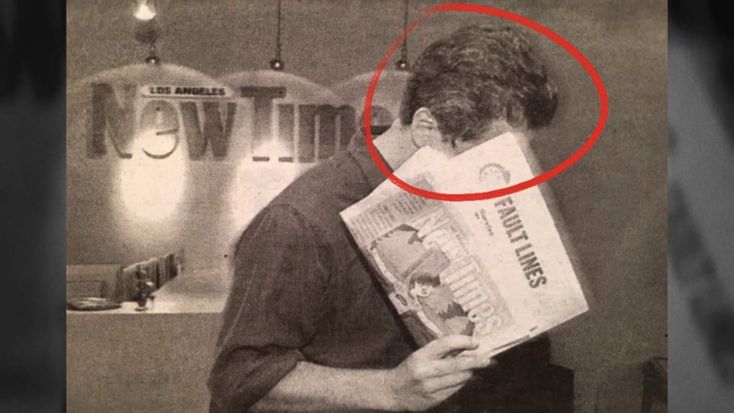Since high school in the 1970s, Tony Ortega has honed his skills at writing ludicrous, sometimes vicious, fiction in the guise of news reporting. It was easy to get away with it, even be applauded for it, while toiling at alternative weeklies owned by Michael Lacey and James Larkin. They were too busy tending to their human trafficking cash cow, Backpage.com, to bother with holding their reporters to high standards of truthtelling.
Even in Ortega’s last job, at Village Voice, from which he was let go in 2012, it was evident no one looked over his shoulder monitoring truth versus fiction in his blogging. A perfect setup for Ortega. No moral compass of his own and no one suggesting he find one.
Ortega took “fake news” to an all new level long before the term was coined. His personal code of journalism ethics was to concoct ludicrous stories, slick them over with some phony journalistic devices, and then watch gleefully as readers reacted. He would be censured and then carry on as before, launching his next Big Lie.
Of a notable instance of an entirely made-up story that provoked righteous indignation from other media, The Daily Cannibal wrote:
“Tony Ortega takes two teenagers, already brutally raped by thugs, and editorially sodomizes them by appropriating their identities, putting lies in their mouths, and pimping them as shameless opportunists.”
The story appeared in “Fault Lines” under the pseudonym “Antoine Oman,” in an August 2002 New Times Los Angeles edition. Intended to titillate readers with its report that NBC had just signed two rape victims to star in a reality series called Survive This! Ortega wrote that “several paroled repeat sex offenders” would be placed in “locations miles from the drop zones” of the contestants of this proposed show.
As the story went, two young women in Los Angeles, whose real-life brutal sexual assault by a sex offender had led to arrests in the area, would “star” as contestants. The teenage girls would be pitted against these actual sex offenders in a bizarre stalking game to see if they could once again survive rape.
The Hollywood Reporter picked up the story and asked NBC to confirm it was planning to release such a series. NBC vehemently denied such an idea for a series had ever existed.
As the story ricocheted around Hollywood, it was then announced—by none other than Tony Ortega himself—that the entire story was a hoax. But who was to blame? The phantom reporter “Antoine Oman.” Ortega shamelessly carried on with the very unfunny “joke,” reporting that the despicable reporter had been found and summarily fired, evidenced by a photo showing the nonexistent journalist leaving New Times in disgrace, holding a copy of the paper containing the offending article.

More from the Daily Cannibal:
“Buzz has it that this article was in fact a hoax-within-a-hoax; that ‘Antonie Oman’ doesn’t exist and was a pseudonym for Tony [‘Antoine’] Ortega [‘O-man’], the New Times L.A. reporter who penned the ‘our fault’ follow-up article.”
“Sound familiar? All the usual earmarks:
- a fabricated story
- written at the expense of two innocent victims whose names he now further dragged through the mud to promote himself, and finally,
- a desperate and ill-conceived coverup, even more disingenuous than the original fraud, which at least had elements of truth to it.”

After the debacle, Ortega didn’t change his ways. He did it again.
In 2005, at the Kansas City Pitch, at the time a Village Voice Media weekly, he wrote a front-page fantasy dubbed “Rebel Hell,” billed as a straight news story reporting that workers on a downtown arena construction project had discovered graves containing the remains of Confederate soldiers. Ortega quoted anonymous (nonexistent) government officials and claimed the City was keeping it from the public while they scrambled to devise a way to save the arena project.
When embarrassed and outraged City officials and citizens lambasted Ortega for the deception, he brushed off the whole affair as a “joke.” No one else thought it was funny.
A comment on the Pitch website said it: “Tony Ortega has single-handedly ruined the Pitch’s journalistic integrity with his story ‘Rebel Hell’ (June 23). Why would anyone believe anything else that the Pitch publishes from now on?”
Columbia Journalism Review took a much harsher view of Ortega’s stunt. “The long piece ‘Rebel Hell’ featured anonymous government officials and breathless news, with all the veneer of an investigative report,” wrote CJR’s Edward Colby.
“Let us count the ways in which this is wrong,” Colby said. “It was bad enough that the spoof took cheap shots at politicians, put words in their mouths and betrayed readers’ trust at a time when the media’s credibility is at an ebb. But the official explanation—that the Pitch raised ‘Rebel Hell’ just because it could—is simply inexcusable.”
Such scathing condemnation from the publication which, for decades, has been the arbiter of professional journalism, should have been the final nail in Ortega’s corrupt career. But in the world of New Times, he was ushered out of town and surfaced at another New Times paper.
At his next stop on the New Times circuit, Ortega outdid even his own disgraceful record. At the Broward-Palm Beach edition in South Florida he published an implausible and damaging story that incensed journalists everywhere.
When a staff reporter pitched a story to Ortega about a billionaire who slept with his own daughter, he ran the story despite zero possibility that he did not know the saga was a total fabrication.
The Daily Cannibal reported: “Based on the stories of an extortionate ex-wife, a deranged daughter, and a few other pieces of ‘evidence’ so obviously flimsy or clearly fabricated, he accused a wealthy philanthropist of bedding and marrying his own long-lost daughter. It didn’t trouble Ortega at all that the story was clearly a fraud. Because he’s done this before... He decided to run with a story that no editor in his right mind would have entertained publishing for a nanosecond.”
But this was Tony Ortega and this was the New Times culture.
Daily Cannibal: “What do you do when your ambition outstrips your ability?… It appears that what gets you fired at any other newspaper gets you promoted in the Village Voice Media chain.”
And thus Tony Ortega was plucked from South Florida by Michael Lacey and James Larkin and dropped in to the editor’s chair at Village Voice. Because they had burned through five editors in the first two years they owned the Voice, by 2007 Lacey and Larkin were desperate to find someone who would take the job. So just as Ortega burned his bridges in Broward-Palm Beach with his latest fake story, his bosses scraped him off the bottom of the New Times barrel and installed him in Manhattan to do their bidding and protect their Backpage.com money machine.
A sweet deal all the way around, until it turned sour, really sour, a few years later.



